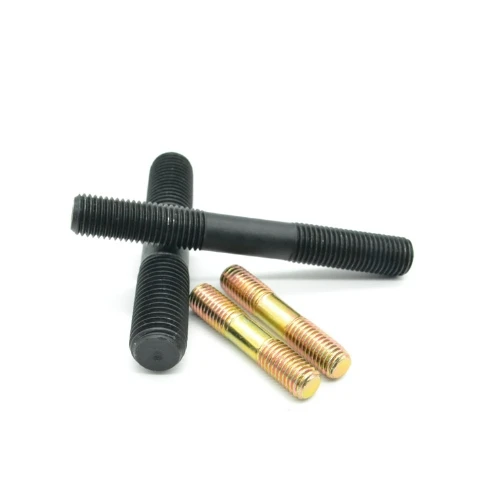best tie bolts
Dec . 11, 2024 11:30 Back to list
best tie bolts
Understanding the Best Tie Bolts A Comprehensive Guide
Tie bolts, often referred to simply as tie rods, play a crucial role in various structural applications. They are typically used in construction, machinery, and engineering to prevent tensile failure by holding parts together under various forces. When talking about the best tie bolts, it is essential to consider factors such as material, design, application, and manufacturer reputation.
What Are Tie Bolts?
Tie bolts are elongated fasteners that exert a pulling force to hold two structures together. Unlike traditional bolts that are primarily used to connect parts through shear forces, tie bolts are designed to withstand tensile forces. They can be found in numerous applications, from bridges and buildings to tension cables in suspension systems.
Material Selection
The material of a tie bolt is a crucial factor in determining its strength and durability. Common materials include
1. Steel Often the primary choice due to its high tensile strength and versatility. Steel tie bolts can be further categorized as carbon steel, stainless steel, or alloy steel, depending on the specific requirements of the application.
2. Aluminum While not as strong as steel, aluminum offers a great weight-to-strength ratio and resistance to corrosion, making it a popular choice for lightweight applications.
3. Plastic or Composite Materials Under specific conditions, tie bolts made from high-performance plastics or composites may be employed, particularly where electrical insulation or corrosion resistance is required.
Selecting the right material involves balancing cost, weight, strength, and environmental resistance, making this choice pivotal in the overall effectiveness of the tie bolt.
Design and Specifications
Tie bolts come with various design features to optimize performance
- Thread Type The thread design can affect load distribution and retention. Fine threads are often used for precision applications, while coarse threads can allow for quick assembly in more rugged environments.
best tie bolts

- Length and Diameter These dimensions must be selected based on the specific requirements of the structure. A longer bolt offers more pull-out strength, while a wider diameter can provide improved load-bearing capacity.
- Coatings and Treatments Many tie bolts undergo surface treatments like galvanization or anodization to enhance corrosion resistance. Such treatments are essential in applications exposed to harsh environments, such as marine or industrial settings.
Choosing the Best Tie Bolts
To select the best tie bolts for your specific needs, consider the following steps
1. Identify Load Requirements Understand the forces that the tie bolts will bear. Calculate the tensile load and ensure the selected bolts can withstand that load with a suitable safety factor.
2. Consider the Environment Assess environmental conditions such as temperature, moisture, and chemical exposure. This assessment will help determine the correct material and coatings.
3. Compliance with Standards Ensure that the tie bolts comply with relevant industry standards and regulations. Many industries have specific guidelines governing the use of fasteners, which help ensure safety and reliability.
4. Manufacturer Reputation Opt for tie bolts from reputable manufacturers with a proven track record in quality and performance. Reviews, certifications, and warranties can significantly guide your decision.
Industry Applications
Tie bolts are versatile and utilized across various fields, including
- Construction Used in reinforcing structures, tensioning cables, and supporting beams. - Automotive Found in suspension systems to maintain vehicle stability and performance. - Aerospace Critical in aircraft design to ensure structural integrity in high-stress components. - Marine Employed in shipbuilding and offshore platforms to withstand harsh marine environments.
Conclusion
The best tie bolts are those that meet the specific demands of their applications through appropriate material selection, design, and compliance with industry standards. By considering factors such as load requirements, environmental conditions, and manufacturer reputation, you can ensure that your tie bolts will provide the necessary support and security for your structures. As with any engineering component, investing time in selecting the right tie bolts will pay dividends in the form of safety, reliability, and enhanced performance.
Latest news
-
High-Quality Panel Stud Bolt Reliable Panel Stud Bolt Factory & Suppliers
NewsJul.08,2025
-
High-Precision Fine Thread Locknuts Manufacturer & Supplier Custom Solutions
NewsJul.08,2025
-
PH Imperial Stud Bolt – High Strength Fasteners from Leading Supplier & Factory
NewsJul.07,2025
-
High-Quality Allen Wrench Bolts Leading Factory, Company & Suppliers
NewsJul.07,2025
-
Wholesale Ball Stud Bolt - High Quality Supplier & Factory Price Reliable Wholesale Ball Stud Bolt Company
NewsJul.06,2025
-
High-Strength Alloy Bolts Manufacturer & Supplier Quality Alloy Fasteners Factory
NewsJul.06,2025
